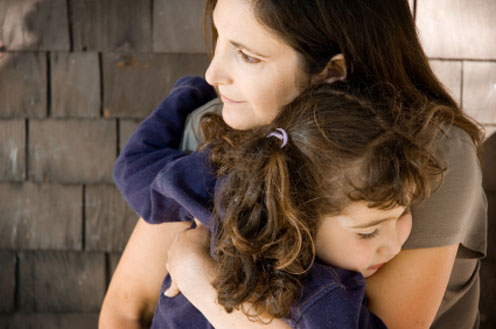Helping Kids Deal with Death

Facing a death in the family is challenging. Not only do you have to manage your own grieving, but you’re also bridled with the task of figuring out what to say and do to help your children through the difficult times of understanding what dying is and help them cope with the loss.
So how can we help our children deal with bereavement? Consider these ideas on where to start:
Be truthful, but age appropriate. Aim to share the truth in age-appropriate ways. Use language that is concrete and simple. Young children don’t understand ‘He has gone to the other side’ or ‘He is in a happier place’. Certainly never say ‘He is sleeping’ or you’ll never have another anxiety-free, tuck-in again!
Instead, try something simple like ‘Grandpa had something they call ‘heart failure’. That means Grandpa’s heart stopped working because he was older and it was worn out. You need your heart to live and breathe’.
It’s fine to share your religious belief on the afterlife, but I recommend telling children that different people have different ideas about what happens to their spirit when people die, and then share what your faith believes. This is a great way to expose them to diverse thinking in the world and models acceptance of human differences.
It’s also okay to say ‘I don’t know’ or ‘I wish I knew’ to children. We don’t always have to have all the answers.
Help them cope with their emotions. Children need to express emotionally. It may take many conversations for a child to process all that they are thinking and feeling. Be sure to invite them to ask questions or talk about it at any time. Explain that there is no right or wrong way to feel, and there is no timeline to bereavement. Some people are very sad, other people handle sadness differently. That’s okay’some will feel sad later. Others will act angry or silly. Some children are not verbally oriented, and would prefer to draw or play-act their feelings. Be sure to offer outlets for different forms of expression. Be extra warm, cuddly and re-assuring in the coming weeks.
Healing can be an active process. Children, like adults, feel better when they can take some action to respond to a life situation that makes us feel powerless. Ask your children what they would like to do to celebrate and remember Grandpa. Perhaps they would like to draw a card and put it on his gravesite. Maybe they would like to share a favourite memory each night before going to bed, or make a photo album.
Handle hospital and funeral visits with sensitivity. Very young children will not understand the events happening around them, so leave trips to the hospital, or funerals to your discretion depending on their temperament. For older children, you can ask if they would like to visit the hospital and prepare them for what they will see (like explaining what an IV tube is, or how Grandpa won’t look the way he used to). Give them the option and allow them to change their mind. The same goes for funerals. Explain what happens at a funeral, and ask if they want to attend’but let them decide. If they decide to attend, bring another caregiver so they can exit with the children, should it be necessary. Having a private family memorial at home later allows you to say your good-byes in a setting that may be more memorable, and meaningful.
Check various resources. There are wonderful resources available to families. Recommended ones include:
- Sad Isn’t Bad: A Good-Grief Guidebook for Kids Dealing with Loss
- The Bereaved Families of Ontario has local branches that offer ideas and support. See what your province offers locally.
- Peer support can be found through organizations like Rainbows















